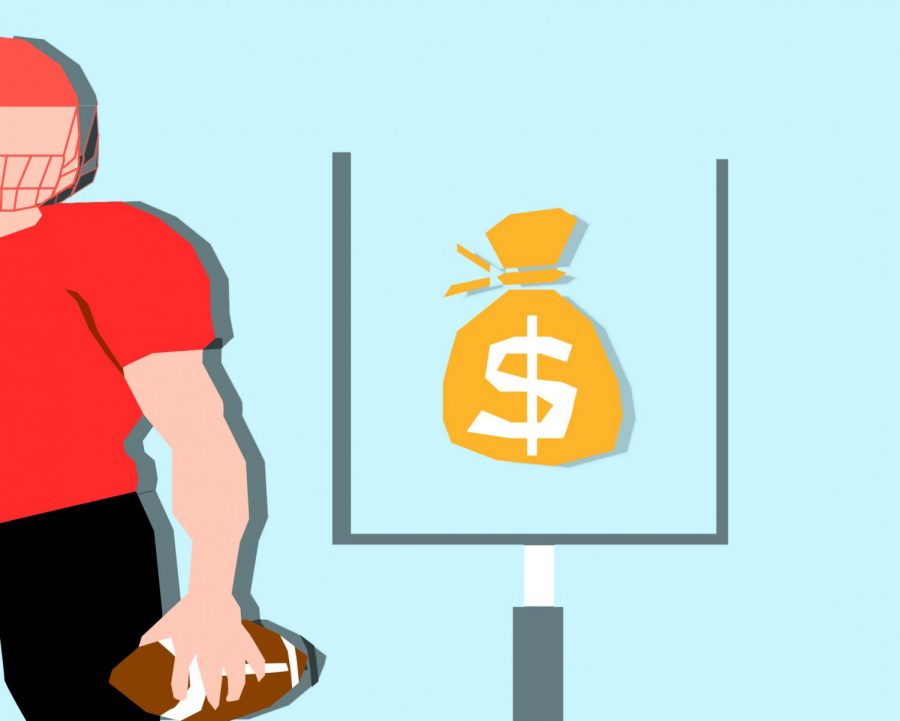OPINION: Student athletes should be paid for their work
Student athletes bring in money; they should be allowed to license their image
Student athletes should get paid for their work because they’re performing a service that makes money for the school.
November 4, 2020
College athletes should be compensated for the amount of publicity and revenue they bring to their schools. However, deciding an equitable price across America is not an easy task.
In 2018, the University of Texas’ athletic program brought in a whopping $219 million. That is far too much to bring in without paying the players that made that revenue possible.
At the same time, deciding a market value for the athletes is trickier than it sounds.
“There’s not a blanket salary … the third-string quarterback just has to put on his uniform. He also has to spend all of his time preparing if he has to go in but there is a performance-based incentive that needs to be involved in pay for play,” said Chris Lebens, clinical assistant professor of sport management.
It would be very difficult to develop a solution to this problem. Someone doing shotput at a community college probably should not make the same amount as the starting quarterback at a school, such as Alabama or Texas, that make huge amounts of money per year from their athletics departments.
Another huge component of a fair salary is ensuring that male and female athletes are compensated equally. Title IX states: “No person in the United States shall, based on sex, be excluded from participation in, be denied the benefits of, or be subjected to discrimination under any education program or activity receiving Federal financial assistance.”
Finding a way to pay everybody on campus equally, regardless of sport or gender, would be a very hard process but would have to be taken with the utmost importance while trying to determine how to pay these student-athletes.
However, the NCAA made a ruling that will allow players to make profits from their name, image and likeness called the NIL. This allows players to license their personal information to make money from sponsorships and ad deals.
“This exists outside of the university structure. This is talking about the ability of athletes to promote themselves, to endorse products, to sign agreements with third parties — apparel companies, local businesses,” said Scott Jedlicka, assistant professor of sport management.
This ruling will be in effect in 2021 and will allow collegiate athletes to make money based on their likeness. While they will not be paid by the university itself, these athletes will still be able to make money due to their popularity.
This will help some of the college athletes who aren’t hugely popular and could help them make some money and get in the spotlight.
Being a football video game fan myself, it would be exciting for NCAA College Football to return to the Xbox because it was discontinued in 2014 due to NIL issues. The popularity of the game is unmatched; NCAA Football 2014 can be bought from Walmart for $160.
Paying college athletes is not as easy as it may seem — there are issues with equity and making sure that the market value is fair for paying these players. At the same time, universities like Texas are making upwards of $200 million a year, and it might seem like they are taking advantage of their athletes without compensating them.










Fred • Nov 8, 2020 at 2:14 pm
Student athletes already ARE paid: They get full scholarships, which can be worth not only tuition/board costs of up to $250K, but also the value of the degree over their lifetimes (over $1M). Why should they get any more than that? Considering the number of students in debt across the country paying for their degrees, it’s clearly a currency student athletes don’t value. Not the taxpayers’ issue! If these kids want to get paid? They don’t have to go to college. They can go pro right away out of high school. Play hoops in Europe, play minor-league baseball, etc. This is not the responsibility of taxpayers AT ALL. If you insist on this position, then student athletes have to pay their own way through college like the rest of us—no scholarships.
Stop putting athletes on a pedestal they don’t deserve, because science and art students enhance the school’s “income” as well, and I don’t see anyone suggesting they should get paid, too. The guy who started the browser wars in the mid-1990s at the University of Illinois didn’t get to profit of his invention of Netscape: He just took it professionally and went public. Athletes are not different, and it’s sad to see people not really understanding this reality. There is a reason college sports are amateur, and again, if the athletes want to get paid, they must skip college and go pro after high school. Colleges don’t exist to pay athletes to not graduate.